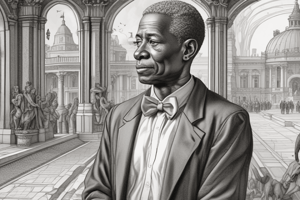Podcast
Questions and Answers
What was the main result of the Act of Union/South Africa Act?
What was the main result of the Act of Union/South Africa Act?
- It restricted voting rights to the minority white population (correct)
- It ended racial segregation
- It established equal representation for all races
- It gave voting rights to all citizens
What did the Mines and Works Act (1911) reserve for whites?
What did the Mines and Works Act (1911) reserve for whites?
Semi-skilled positions in mines
What was the purpose of the Natives Act/Urban Areas Act (1923)?
What was the purpose of the Natives Act/Urban Areas Act (1923)?
To segregate urban residential space and create influx controls
The Native Lands Act (1913) allowed whites to buy land from natives.
The Native Lands Act (1913) allowed whites to buy land from natives.
What did the Industrial Conciliation Act (1924) allow?
What did the Industrial Conciliation Act (1924) allow?
What was established by the Representation of Natives Act (1936)?
What was established by the Representation of Natives Act (1936)?
What was the main purpose of the Native Laws Amendment Act (1937)?
What was the main purpose of the Native Laws Amendment Act (1937)?
What is Grand Apartheid?
What is Grand Apartheid?
What did Petty Apartheid ensure?
What did Petty Apartheid ensure?
What did the Prohibition of Mixed Marriages Act (1949) prohibit?
What did the Prohibition of Mixed Marriages Act (1949) prohibit?
The Immorality Act (1950) banned extramarital relationships between whites and colors.
The Immorality Act (1950) banned extramarital relationships between whites and colors.
What did the Population Registration Act require?
What did the Population Registration Act require?
What did the Group Areas Act do?
What did the Group Areas Act do?
What did the Suppression of Communism Act do?
What did the Suppression of Communism Act do?
What was the purpose of the Pass Laws Act (1952)?
What was the purpose of the Pass Laws Act (1952)?
What did the Bantu Education Act (1953) legalize?
What did the Bantu Education Act (1953) legalize?
What did the Separate Amenities Act allow?
What did the Separate Amenities Act allow?
Flashcards are hidden until you start studying
Study Notes
Acts Related to South African Apartheid
-
Act of Union/South Africa Act: Established a legislative framework that restricted voting rights to the minority white population in South Africa.
-
Mines and Works Act (1911): Reserved semi-skilled positions in the mining sector exclusively for whites, pushing black individuals into poorly paid jobs in urban and rural areas.
-
Natives Act/Urban Areas Act (1923): Introduced segregation in urban residential areas and imposed "influx controls" to limit black access to cities.
-
Native Lands Act (1913): Prohibited land transactions between whites and native Africans, institutionalizing land segregation.
-
Industrial Conciliation Act (1924): Allowed trade union registration for whites but denied similar rights to black workers, reinforcing labor discrimination.
-
Representation of Natives Act (1936): Removed African individuals from the electoral role in Cape, creating an advisory council for native representatives without real authority.
-
Native Laws Amendment Act (1937): Enabled stricter enforcement and regulation of existing pass laws governing black movement within urban areas.
-
Grand Apartheid: Represented a shift from petty apartheid to a comprehensive system aimed at total territorial segregation, promoting independent development of different racial groups.
-
Petty Apartheid: Focused on social and economic domination of whites over black populations, enforcing systemic racial discrimination.
-
Prohibition of Mixed Marriages Act (1949): Legislation that outlawed marriages between "Europeans" and "non-Europeans," marking the aggressive implementation of apartheid principles.
-
Immorality Act (1950): Forbade extramarital sexual relations between white individuals and people of color, continuing the legal framework of racial divisions.
-
Population Registration Act (1950): Mandated racial classification and registration of all South African inhabitants, underpinning the apartheid system's bureaucratic structure.
-
Group Areas Act: Instituted racial classification of the entire population, leading to enforced residential segregation based on race.
-
Suppression of Communism Act (1950): Legislation that banned the Communist Party and any groups aligned with communism, broadly defined to include various anti-apartheid movements.
-
Pass Laws Act (1952): Created an internal passport system to control and restrict the movements of black South Africans and other non-white populations.
-
Bantu Education Act (1953): Established racially segregated educational facilities, fundamentally altering the education system and reducing opportunities for black students.
-
Separate Amenities Act: Legalized the racial segregation of public facilities, services, and vehicles, with the exception of public roads and streets.
Studying That Suits You
Use AI to generate personalized quizzes and flashcards to suit your learning preferences.




